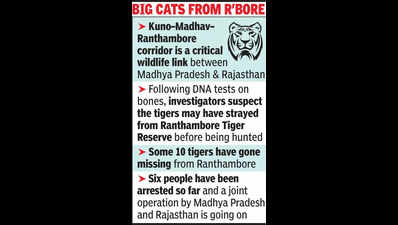Bhopal: DNA tests on bones seized from a poaching syndicate operating in Madhya Pradesh’s Sheopur and Shivpuri districts have confirmed killings of three tigers along the Kuno–Madhav–Ranthambore corridor, a critical wildlife link between Madhya Pradesh and Rajasthan. Investigators suspect the tigers may have strayed from Rajasthan’s Ranthambore Tiger Reserve before being hunted.The forensic analysis, carried out by Nanaji Deshmukh Veterinary Science University in Jabalpur, has alarmed wildlife officials across both states — and may offer the first concrete lead in the ongoing mystery of at least 10 missing tigers from Ranthambore.“This could be a major lead,” said a senior Madhya Pradesh forest officer, as the state formally requested Rajasthan’s assistance in matching DNA profiles to their missing big cats. Ranthambore field director Anoop Nair did not respond to repeated calls seeking his version. Confirming the development, additional principal chief conservator of forests (Wildlife) L Krishnamurthy told TOI: “Forensics have confirmed that the bones and skulls are of three tigers. We have arrested six people so far and a joint operation by Madhya Pradesh and Rajasthan is going on. More forensic support is being taken to get deeper into the case.”The case surfaced after a series of coordinated raids on June 4 by the State Tiger Strike Force (STSF) units from Bhopal and Shivpuri, along with Sheopur Forest Division, acting on a confidential tip-off. Two separate forest crime cases were registered following the arrests.All the accused belong to the nomadic Mongia community, which has increasingly come under scrutiny in recent years for its suspected links to organised wildlife trafficking across central India. Forest officials believe this syndicate forms part of a broader inter-state network preying on vulnerable wildlife in forested border regions.In one case, 88 pieces of bones — believed to be from tigers and leopards — were recovered from two suspects, Dauji Bhil and Sunita Bhil, at Sheopur bus stand. Their interrogation led to the arrest of Bani Ram and Naresh from Padora Square in Shivpuri. Both were caught with a motorcycle suspected to be used in trafficking.The accused had initially claimed the bones belonged to leopards and hyenas, trying to mislead authorities. However, DNA results confirmed tiger remains, prompting a second round of interrogation. During this, they admitted the tigers were killed using poison and muzzle-loading weapons. They also revealed that they buried the skins after failing to find buyers. Some tiger canines were seized from their possession.The fifth accused, Rajaram Mogia, who had been absconding, was arrested later. He is believed to have provided logistical support in moving poached parts.The second case was registered after 138 pieces of leopard bones were seized from another accused, Besta Bhil, who was arrested near the Shivpuri–Sheopur road. The Kuno–Madhav–Ranthambore landscape has long been regarded as a crucial corridor for movement of big cats, especially with the presence of cheetahs in Kuno National Park and a strong leopard population. However, the same terrain now appears to be exploited by well-organised poaching networks, say officials.“This is no longer about isolated incidents,” a senior forest official said. “We are looking at a highly coordinated criminal network that spans multiple states and possibly involves several layers of trade and trafficking.”
Bones seized from poachers show 3 tigers killed in MP-Raj corridor | Jaipur News





